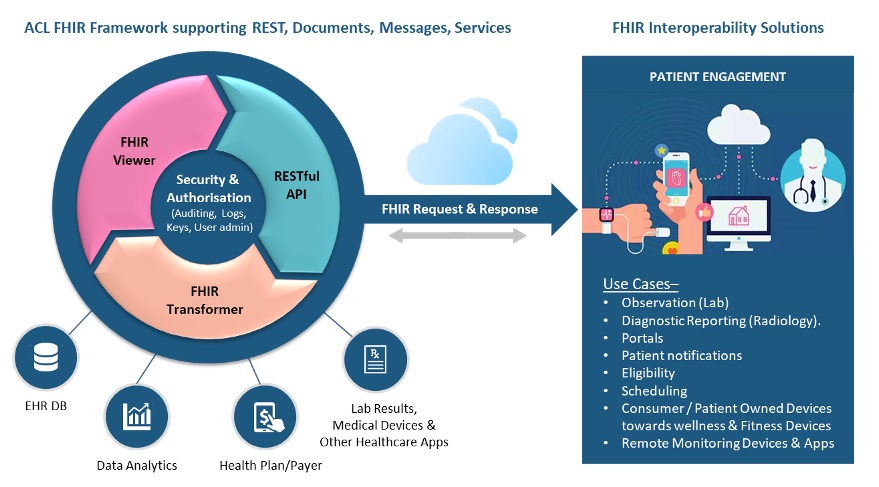
Trending Post
Empowering Seamless Data Exchange in Healthcare – ACL FHIR Framework
FHIR (Fast Healthcare Interoperability Resources) is a standard designed to enhance interoperability and enable seamless data sharing among healthcare systems.
In the rapidly evolving healthcare landscape, seamless data exchange between various entities is critical for efficient patient-centric care. Our Interoperability Framework is designed to bridge the gap between healthcare systems, ensuring secure and compliant data exchange while adhering to HIPAA and other regulatory standards.
- Supports real-time data exchange and batch processing, catering to the diverse needs of healthcare environments. As healthcare systems grow and data volumes increase, our solutions scale effortlessly to meet the rising demands of users and evolving technology.
- Agile and RESTful approach to Healthcare Information Exchange, setting new standards for seamless data sharing in the industry. It combines the best features of HL7 V2, HL7 V3, and CDA, ensuring efficient communication across various healthcare entities.
- Seamlessly integrate FHIR with existing healthcare systems, such as EMRs, EHRs, and patient portals, creating a unified and connected ecosystem. By designing and building FHIR-based APIs, we facilitate secure and real-time data exchange between healthcare systems, applications, and devices, enabling better coordination and communication across the healthcare spectrum.
- Secure and Compliant Solutions for Better Patient Care: Security and compliance are at the core of our Interoperability Framework. Our solutions are built with robust security measures to safeguard patient data during transit and at rest. We ensure strict adherence to HIPAA and other regulatory standards, providing healthcare entities the confidence to exchange sensitive patient information securely.

Supported Healthcare Standards & Protocols
Standards
Protocols
HL 7 v2.x, v3
MLLP
CCD/CCR/CDA
HTTP
FHIR
HTTP
ASC X12
EDI
ICD-9 & ICD-10
JMS
DICOM
Database
NCPDP
Web Services, File System, SFTP
Raw ASCII or Binary
RTF
Delimited text
DICOM
FHIR Software Development Services: Building Bridges Between Healthcare Systems
Our expertise lies in designing and implementing tailored HL7/FHIR interfaces that enable seamless data exchange between different healthcare systems, including EMRs, EHRs, PACS, laboratories, and various third-party solutions. We ensure data consistency and accuracy by facilitating the mapping and transformation of healthcare data from one HL7 version to another or other formats.
With proficiency in various versions of HL7/FHIR standards, including HL7 v2.x and HL7 FHIR (Fast Healthcare Interoperability Resources), we stay up-to-date with the latest advancements to provide cutting-edge solutions to our clients.
Key Features:
Agile and RESTful Approach:
Embracing modern methodologies, our framework adopts an Agile approach, enabling rapid development and flexibility. The RESTful architecture style ensures a smooth and efficient exchange of information using messages or documents.
Next-Generation Technology:
Our framework represents the future of healthcare data exchange, incorporating the latest technological advancements. It is tailored for mobile apps, cloud communication, and EHR-based data sharing, empowering healthcare entities to connect seamlessly.
Web Standards Foundation:
With a strong foundation in Web standards such as XML, JSON, HTTP, Atom, and OAuth, our solution guarantees robust and secure data exchange. This ensures compliance with industry-wide protocols and regulations.
Use Case Scenarios:
Interoperability Solutions across Healthcare Segments:
Our framework breaks down barriers between different healthcare segments, enabling seamless communication between hospitals, clinics, laboratories, and other providers. This interoperability enhances collaboration and improves patient care.
Independent Apps with FHIR Integration:
By adopting FHIR standards, our framework facilitates the development of independent apps capable of specific EHR functions. This saves time and effort in integration, fostering a thriving ecosystem of healthcare applications.
Standard UI across EHRs:
Our Interoperability Framework offers a standardized user interface across various EHRs, streamlining the user experience for healthcare professionals. This consistency enhances efficiency and reduces the learning curve.
Flexible Deployment Options:
Our solution can be deployed on-premise, ensuring data sovereignty and providing complete control over the information exchange process. This flexibility caters to diverse organizational needs.
Secure Exchange with OAuth 2.0:
Security is paramount in healthcare, and our framework addresses this with OAuth 2.0 integration. It provides robust authentication and authorization mechanisms, ensuring data confidentiality and integrity.
The Interoperability Framework is poised to transform healthcare data exchange, offering unparalleled efficiency, security, and flexibility. By embracing the latest technologies and standards, we empower healthcare entities to adopt a connected future, improving patient outcomes and streamlining workflows.
